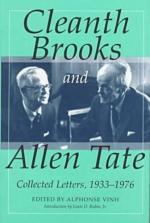|
This section contains 1,211 words (approx. 5 pages at 300 words per page) |

|
SOURCE: "The Strange Fate of William Faulkner," The New York Review of Books, Vol. XXXVIII, No. 5, March 7, 1991, pp. 47-52.
[Crews is an American educator and critic. In the following excerpt from an essay that surveys several recent volumes of Faulkner criticism, he assails Brooks's recent and past interpretations of Faulkner's work as "Agrarian party line" and "indefensible."]
By the postwar era the points of irreconcilable conflict between Agrarian/New Critics and ex-Marxist intellectuals had narrowed to an extraordinary degree. All were congregating in the academy, none were pressing activist causes, and for varying reasons they all could make their peace with both literary nationalism and international modernism as it was personified, however fastidiously, in "Mr. Eliot." Since there was much in Faulkner's work that could have caused unreconstructed Agrarians and Marxists alike to accuse him of political waywardness, this blurring of old antagonisms was crucial for the coming...
|
This section contains 1,211 words (approx. 5 pages at 300 words per page) |

|


